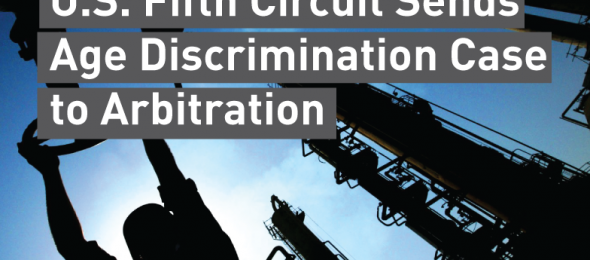The United States Fifth Circuit Court of Appeals has held that an age discrimination claim must be arbitrated. In Klein v. Nabors, No. 11-30824 (5th Cir. 2013), an oil rig worker, Gary Klein, sued his former employer, Nabors Drilling USA, for age discrimination in the Western District of Louisiana after he was terminated from the company. Prior to his employment, Klein reportedly signed a company form that acknowledged all employment disputes would be subject to arbitration using the corporation’s dispute resolution program. In response to the lawsuit, Nabors filed a motion to compel arbitration and a motion to stay the court proceedings. The Western District of Louisiana denied Nabors’ motion and held that the arbitration requirements included in the acknowledgement form were ambiguous. Nabors then appealed the matter to the Fifth Circuit.
First, the three-judge panel dismissed Klein’s argument that the acknowledgement form was ambiguous and he did not agree to exclusively arbitrate all employment law claims against Nabors. The court said,
Here, the agreement includes both the Acknowledgment and the Program. The Acknowledgment provides that Klein received a copy of the Program and understood that it was not a contract of employment. The Acknowledgment also explains that nothing in the Program is intended to violate or restrict any rights guaranteed to Klein by state or federal law. By signing the Acknowledgment, Klein agreed to adhere to the Program “and its requirement for submission of disputes to a process that may include mediation and/or arbitration.”
Next, the court analyzed the provisions of the dispute resolution program and stated Klein’s age discrimination claim was subject to arbitration despite that the program does not preclude the use of nonbinding dispute resolution methods as a way to avoid arbitration. According to the Fifth Circuit panel,
Interpreting the Acknowledgment and the Program as a whole, we find an unambiguous common intent that arbitration is to be the final, binding method of resolution under the Program. The allowance of nonbinding methods does not change the analysis. Parties are always free to attempt to work together and reach a mutually beneficial result before absorbing the not insignificant costs associated with arbitration. Their decision to do so does not strip an arbitration agreement of its effect.
The court continued by stating that the permissive language included in the acknowledgement form explicitly states any employment disputes will be subject to binding arbitration and fails to offer the option for judicial resolution.
Finally, the Appeals Court said Klein’s reliance on a provision in the acknowledgement form which states the company’s dispute resolution program was not intended “to violate or restrict any rights of employees guaranteed by state or federal law” meant a judicial remedy was also available was misplaced. The court stated,
Our task is to interpret each provision in a manner consistent with the contract as a whole—not to tailor our interpretation of the entire contract to fit one provision. When interpreting the provisions together, it becomes clear that the Acknowledgment disclaims a restriction only on substantive rights that would have been available to Klein in a judicial forum. This interpretation is consistent with both the Program’s language and the law governing arbitration agreements.
Because the Fifth Circuit panel found the parties had an unambiguous agreement to arbitrate, the appellate court reversed the lower court’s ruling and remanded the case with instructions to submit the dispute to arbitration.














